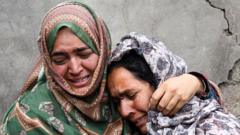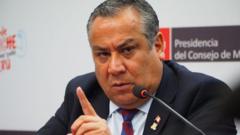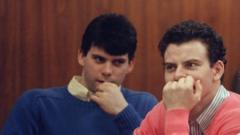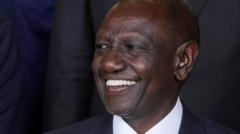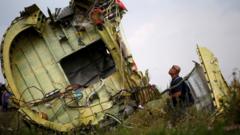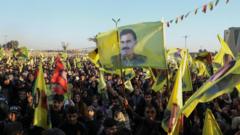The assassination of Delphin Katembo Vinywasiki, known as Delcat Idengo, has reverberated throughout the Democratic Republic of Congo, highlighting the perilous intersection of music, politics, and violence in a country rife with armed conflict. The talented musician was found dead while filming a music video in Goma, a town grappling with severe instability due to clashes between armed groups and governmental forces.
Tragic Death of Congolese Musician Sparks Outrage Amid Ongoing Conflict
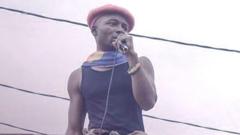
Tragic Death of Congolese Musician Sparks Outrage Amid Ongoing Conflict
A beloved artist, Delcat Idengo, has been killed in Goma, escalating tensions in Congo's conflict zone.
Idengo, recognized for his revolutionary music that criticized both state authorities and insurgent groups, was discovered lying in the street, his body stained with blood, fueling speculation that he was shot. His recent release, titled Bunduki—Swahili for "weapon"—further underlined his condemnation of the M23 rebel group's occupation of Goma, which has reignited violence in the region.
The tumultuous backdrop of Idengo's death features escalating tensions and recent upheavals, including a significant offensive by M23 rebels, allegedly supported by Rwanda. The ongoing clashes have resulted in a staggering death toll of approximately 2,900 people and the displacement of around 700,000 individuals, as highlighted in the latest UN reports.
Official statements from government representatives, including spokesperson Patrick Muyaya, have condemned Idengo's death as an "abominable act" and have attributed the blame to M23 rebels. However, dissenting claims from the M23 insurgents indicate they suspect government-aligned forces may be responsible for the musician's assassination.
In light of this tragic event, public outcry surged in various parts of the country. Demonstrators took to the streets in Idengo's birthplace of Beni, demanding accountability and justice, a reflection of the growing discontent and fear enveloping citizens in North Kivu province.
The Congolese Ministry of Arts and Culture characterized the event as an assassination, commemorating Idengo as a "committed voice" for a generation seeking change. The loss has drawn grieving sentiments from various corners of political opposition, with figures like Martin Fayulu and Moïse Katumbi expressing their condolences and calling for strong actions against his assailants.
Idengo's history with the law adds another layer of complexity to his story—previously jailed for inciting violence and criticizing the president, he had gained notoriety for his bold messaging through music. His murder opens a discussion about the risks that artists face in oppressive political landscapes, particularly in conflict zones, and the need for an end to the ongoing violence affecting countless lives in the DR Congo.
The tumultuous backdrop of Idengo's death features escalating tensions and recent upheavals, including a significant offensive by M23 rebels, allegedly supported by Rwanda. The ongoing clashes have resulted in a staggering death toll of approximately 2,900 people and the displacement of around 700,000 individuals, as highlighted in the latest UN reports.
Official statements from government representatives, including spokesperson Patrick Muyaya, have condemned Idengo's death as an "abominable act" and have attributed the blame to M23 rebels. However, dissenting claims from the M23 insurgents indicate they suspect government-aligned forces may be responsible for the musician's assassination.
In light of this tragic event, public outcry surged in various parts of the country. Demonstrators took to the streets in Idengo's birthplace of Beni, demanding accountability and justice, a reflection of the growing discontent and fear enveloping citizens in North Kivu province.
The Congolese Ministry of Arts and Culture characterized the event as an assassination, commemorating Idengo as a "committed voice" for a generation seeking change. The loss has drawn grieving sentiments from various corners of political opposition, with figures like Martin Fayulu and Moïse Katumbi expressing their condolences and calling for strong actions against his assailants.
Idengo's history with the law adds another layer of complexity to his story—previously jailed for inciting violence and criticizing the president, he had gained notoriety for his bold messaging through music. His murder opens a discussion about the risks that artists face in oppressive political landscapes, particularly in conflict zones, and the need for an end to the ongoing violence affecting countless lives in the DR Congo.






